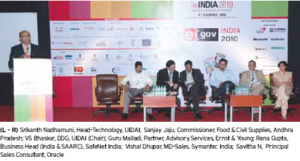Fool-proofing is easier said than done
 UID’s schema is holistic and biometric makes it free of any cracks but that also makes implementation a tough task
UID’s schema is holistic and biometric makes it free of any cracks but that also makes implementation a tough task
The Unique Identification (UID) project aims to give the 1.2 billion residents of the country a unique 12-digit identification number. The number, by ensuring such registration and recognition of individuals, would help the state deliver their rights to them. Over five years, the UID Authority plans to issue 600 million Aadhaars. To understand the implementation strategy and the progress made at it, as also for leveraging it for maximum benefit and to discuss the security concerns, a session was organised with participation from government,potential players, vendors and civil society representatives.

The session was chaired by VS Bhaskar, Deputy Director General, UID Authority of India, Government of India, who put UID in its correct perspective, and discussed its conceptual framework and the progress made so far. He also elaborated upon the implementation and operational challenges, interoperability issues, and how one would utilise an UID number.
The UID number is a unique and a random number. There is no duplication because of the biometric de-duplication being in place. And even though UID is not mandatory, Bhaskar is hopeful that as the value of UID number is enhanced, more and more people in India will join the ecosystem of UID.

Srikanth Nadhamuni, Head of Technology, UID Authority of India, talked about the technological aspects related to UID. If a resident submits his biometric information and substantiates it with the proof of his identity and address, he could be issued a UID number, after the system checks his biometric details against the entire central database of UIDAI. “Since there is no shortcut to matching one’s biometrics with the entire records, this is the most challenging
problem UIDAI is facing,” noted Srikanth.
Rana Gupta, Business Head, India & Saarc, SafeNet India, dealt with privacy issues and the role information security would play in the successful rollout of UID. He commended UIDAI for considering security of database from a data center point of view rather than taking a network or periphery standpoint.
Sanjay Jaju, Commissioner, Food and Civil Supplies Government of Andhra Pradesh, gave the perspective of Registrar of Enrolment and also talked about the experience of AP with the biometric ration card implementation in the state. One challenge that was faced in implementation was that de-duplication and enrolment generation of cards was not happening simultaneously.
Since There is no shortcut to matching one’s biometrics with the entire records, Thisis the most challenging problem uidai is facing
Savitha N, Principal Sales Consultant, Oracle, discussed the role that a master citizen data solution could play in the UID program for consolidating the master database, cleaning data centrally and distributing data as a single point of truth.
Guru Malladi, Partner, Advisory Services, Ernst & Young, applauded the UID program for being holistic and subsuming all other identities because of the uniqueness that the UID number commits. He also said, “UID programme will be very successful because it connects with the social and democratic fabric
of the country.”
Talking about the need to keep abreast with security threats in the digital world, Vishal Dhupar, Managing Director of Sales, Symantec India, remarked that, “UID gives us a business opportunity to prosper in this digital world.”
The question and answer session followed the panel discussion, where participants put forth queries on how universal coverage could be achieved, how it would be ensured that people with multiple disabilities don’t get excluded, and how the security compliance can be met.
Be a part of Elets Collaborative Initiatives. Join Us for Upcoming Events and explore business opportunities. Like us on Facebook , connect with us on LinkedIn and follow us on Twitter, Instagram.











